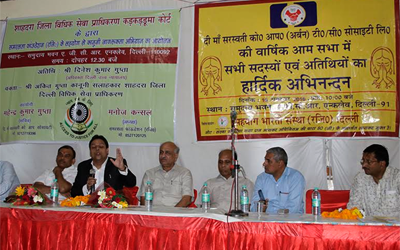 Ranchi, Jharkhand April 28, 2015 :: Child labour is a crime against humanity and a violation of child rights. It deprives children of their right to education and physical, emotional and mental development.
Ranchi, Jharkhand April 28, 2015 :: Child labour is a crime against humanity and a violation of child rights. It deprives children of their right to education and physical, emotional and mental development.
Job Zachariah, Chief of UNICEF Jharkhand Office says, “There are five main strategies to prevent child labour. The most effective strategy to prevent child labour is improving access to quality education. If all children of 6-14 years attend school regularly in the state, there would be no child labour.”
Secondly, there is a need to expand social protection schemes like sponsorship and foster care for taking care of poor and vulnerable children. Under the sponsorship and foster care programme of the Integrated Child Protection Scheme (ICPS), vulnerable families and extended families are provided financial assistance of Rs. 2000 per month per child to meet medical, nutritional and educational needs of the child including for children weaned away from child labour.
Thirdly, child labour should become a socially unacceptable practice as it is a crime against children and violation of their rights. “We need social mobilization to create a social norm against child labour. A vigilant child protection committee at village level can prevent child labour, child marriage and child trafficking”, he said.
Other steps to eliminate child labour include: (a) strict enforcement of laws relating to child labour and education; and (b) establishing vigilant child protection committees in all villages.
In Jharkhand, there were 4 lakh (5.4%) working children of 5-14 years as per Census 2001. As per the latest Annual Health Survey (AHS) of 2012-13, 2.5% of children aged 5-14 years are engaged in work in Jharkhand.
The highest percentage of child labourers in the State, as per AHS 2012-13, are in Pakur (6.9%), followed by Sahibganj (4.7%), West Singhbhum (4.2%) and Godda (3.8%). It is low in big and industrial districts. The rate is lowest in Bokaro (1.3%), followed by Dhanbad (1.4%), East Singhbhum (1.5%), Kodarma (1.6%), Hazaribagh (1.9%), Garwah (2.1%), Ranchi (2.2%), Palamu (2.3%), Dumka (2.4%), Lohardaga (2.5%), Giridih, Gumla & Chhatra (2.6%) and Deoghar (3.1%).
The Child Labour Prohibition and Regulation Act 1986, prohibits employment of children below 14 years in 18 occupations and 65 processes. Any person who employs children in these trades could be punished with imprisonment for 3 months to 1 year and fine of Rs. 10,000 to Rs 20,000 or both.
National Day against Child Labour is observed on 30 April.




